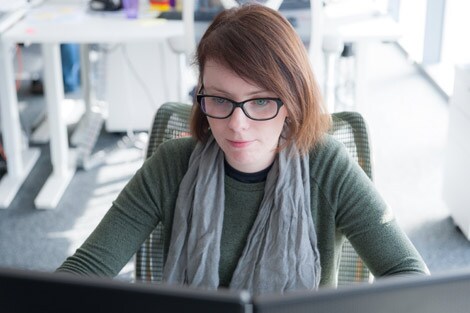“I thought I wanted to work in games development, now I’m writing cancer detection software.”
Name: Nicola Robinson
Position: Senior Software Engineer
Joined Philips: 2016
Start-ups and the games industry attract a lot of developers looking for stimulating roles. But sometimes the real opportunities to work on Software developer, Nicola Robinson, explains why working in digital pathology solutions at Philips offers her the complex and challenging environment she thrives in. “When people ask me what I do for my day job, I say I write cancer detection software for digital pathology. To understand digital pathology you have to understand pathology first. A lot of people think of CSI but actually pathology is the study of disease, so digital pathology is moving away from the glass slides that pathologists analyse human tissue under a microscope to a digital process to enable scans to be viewed and analysed on a computer, to try speed up the pathologists’ workflow and enable them to focus on complex cases. Nicola’s job today is a far cry from the games industry she aspired to work in or the finance industry she first explored. “I studied a Master’s Degree in computer games development at Queens University in Belfast. I did my industrial placement in finance. It was a great experience but the environment wasn’t really for me. I thought the games industry was where I’d be.” A chance passing at a careers “I noticed PathXL and their balance between biology and technical computer science fascinated me but so did the cancer link.” Nicola started at PathXL – later acquired by Philips – and found, unexpectedly that her new role wasn’t in web development. C++ was my main programming language I didn’t know about image analysis or machine learning, I had really good people to learn from. That was a big challenge and This exposure to innovative technology and being open to on-the-job learning continues to appeal. “I was given a lot of trust as a junior developer and, after 2 years, I applied for the role of scrum master and got it. This means that as well as my day to day development work, I have to make sure the teams know what they’re doing and set sprints and deliverables to get releases out on time. The team culture is really good. We all keep asking questions and learning from each other.”

